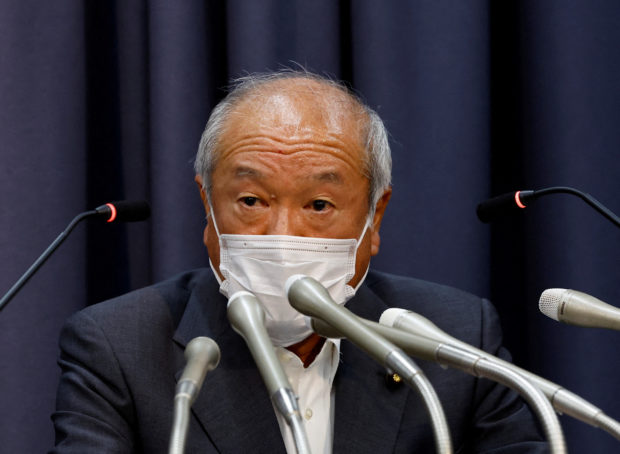
Japan’s Finance Minister Shunichi Suzuki speaks at a news conference after Japan intervened in the currency market for the first time since 1998 to shore up the battered yen in Tokyo, Japan September 22, 2022. REUTERS/Kim Kyung-Hoon/File photo
TOKYO/OSAKA -Japanese Finance Minister Shunichi Suzuki said authorities stood ready to respond to speculative currency moves, a fresh warning that comes days after Tokyo intervened in the foreign exchange market to stem yen falls for the first time in over two decades.
Suzuki also told a news conference on Monday the government and the Bank of Japan (BOJ) were on the same page in sharing concerns about the currency’s sharp declines.
“We are deeply concerned about recent rapid and one-sided market moves driven in part by speculative” trading,” Suzuki told the news conference. “There’s no change to our stance of being ready to respond as needed” to such moves, he added.
BOJ Governor Haruhiko Kuroda echoed Suzuki’s warning that rapid yen moves were undesirable, but stressed his resolve to maintain the ultra-low interest rates blamed by analysts for accelerating the Japanese currency’s declines.
“There are heightening fears of a global economic slowdown,” which could affect Japan’s economy, Kuroda said.
“If risks to the economy materialize, we will obviously take various monetary easing steps without hesitation as needed,” he told a meeting with business executives in Osaka, western Japan.
The remarks came after the government’s decision on Thursday to intervene in the currency market to stem yen weakness by selling dollars and buying yen for the first time since 1998. Analysts, however, doubted whether the move would halt the yen’s prolonged slide for long.
BOJ policy conundrum
The yen’s recent sharp declines, which have pushed up households’ living costs by boosting imported fuel and food prices, have been driven in part by widening divergence between the U.S. Federal Reserve’s aggressive monetary tightening and the BOJ’s ultra-loose monetary policy.
The dollar added 0.54 percent to 144.175 yen on Monday, continuing its climb back toward Thursday’s 24-year peak of 145.90. It tumbled to 140.31 that same day after Japanese authorities stepped into the market.
In the meeting with Kuroda in Osaka, Masayoshi Matsumoto, head of the region’s business lobby Kansai Economic Federation, praised Japan’s decision to intervene in the market.
“It was a meaningful move that showed Japan’s determination it won’t leave unattended sharp market volatility,” he said.
Yoshihisa Suzuki, an executive of trading house Itochu Corp, called on the BOJ to adopt a “balanced” policy approach that takes into account not just the demerits of a weak yen but the potential risks of a sharp yen rise that hurts exports.
“People talk a lot about the demerits of a weak yen. But a strong yen is also painful,” Suzuki said.
While government officials’ jawboning may keep markets nervous of the prospects of further intervention, stepping in repeatedly in the currency market and selling huge sums of dollars could be difficult due to the criticism Japan may face from its G7 counterparts.
The U.S. Treasury Department said last week it “understood” Japan’s intervention was aimed at reducing volatility, but stopped short of endorsing the move.
A few months ago U.S. Treasury Secretary Janet Yellen said of the yen’s depreciation that Washington remained convinced that currency intervention was warranted only in “rare and exceptional circumstances”, and that the market should determine exchange rates for G7 countries.
“It’s unlikely Japan will continue intervening to defend a certain line, such as 145 yen to the dollar,” former top Japanese currency diplomat Naoyuki Shinohara told Reuters.
The yen is not alone in its downward spiral. Several other currencies, including the British pound, the euro and the Chinese yuan, have taken a hammering partly driven by the Federal Reserve’s aggressive interest rate increases in recent months.